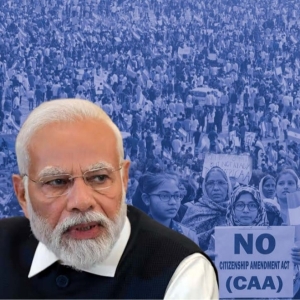
 Fr. Gaurav Nair
Fr. Gaurav Nair
.jpg)
Four years after the enactment of the Citizenship (Amendment) Act 2019 (CAA), the Union Home Ministry has finally issued the Rules, providing clarity on procedures for Hindu, Sikh, Buddhist, Jain, or Parsi migrants from Pakistan, Afghanistan, and Bangladesh who entered India before December 31, 2014, to apply for Indian citizenship. While this move purportedly extends a compassionate hand to vulnerable communities from neighbouring countries, it has sparked a renewed debate on the Act's discriminatory nature and compatibility with the Constitutional principles.
The decision to implement the CAA just days before the announcement of general election dates has raised significant concerns about the ruling party's intentions. Despite being enacted in 2019, its application is being expedited at an unprecedented rate. The timing of this move suggests that the party is exploiting a polarising issue to retain power rather than genuinely addressing concerns.
Observers may find an attempt at pincer tactics. In addition to the possibility of creating chasms between groups, the implementation comes close to the Supreme Court scrapping the electoral bonds. Is it being used to divert the nation's attention from the matter as the SBI's attempts to extend the revelation of the details regarding the bonds were shot down?
The CAA's selectiveness raises concerns about its touted humanitarian motives. If the aim was to provide refuge to vulnerable communities, why is it limited to certain religious groups and specific countries? Excluding certain groups suffering in neighbouring countries raises doubts about the government's goal and commitment.
The notification of the CAA Rules has reignited protests in various parts of the country, underscoring the deep-seated apprehensions surrounding the Act's implications. The government's rush to implement the Rules without adequately addressing these concerns risks further polarization and unrest.
The CAA represents a disjunction from India's defining and fundamental principles of secularism and pluralism. By preferring certain religious groups over others, it not only undermines the very essence of a diverse and inclusive society but also poses a significant threat to our national unity. Rather than fostering unity and compassion, it threatens to deepen divisions and sow seeds of discord.
As the nation braces itself for another round of elections, it is essential to hold political parties accountable for their actions and demand a commitment to upholding constitutional values. The CAA issue should not be used as a pawn in the political game but should be approached with sensitivity and respect for the rights and dignity of all individuals, regardless of their religious or ethnic background.
Despite challenges, citizens must remain vigilant and steadfast in their demand for a fair and inclusive society. Upholding the values that have long defined India as a democracy unique in its ideals and thoughts is not just a responsibility but a source of moral strength. The government must heed the voices of dissent. Political expediency should never precede the principles that define the nation's soul. The test of India's claim to be a "Vishwa Guru" now lies in whether the leadership upholds these principles in the face of adversity or exploits divisive issues for gains. It verifies India's commitment to justice, equality, and the rule of law – principles that must never be compromised.